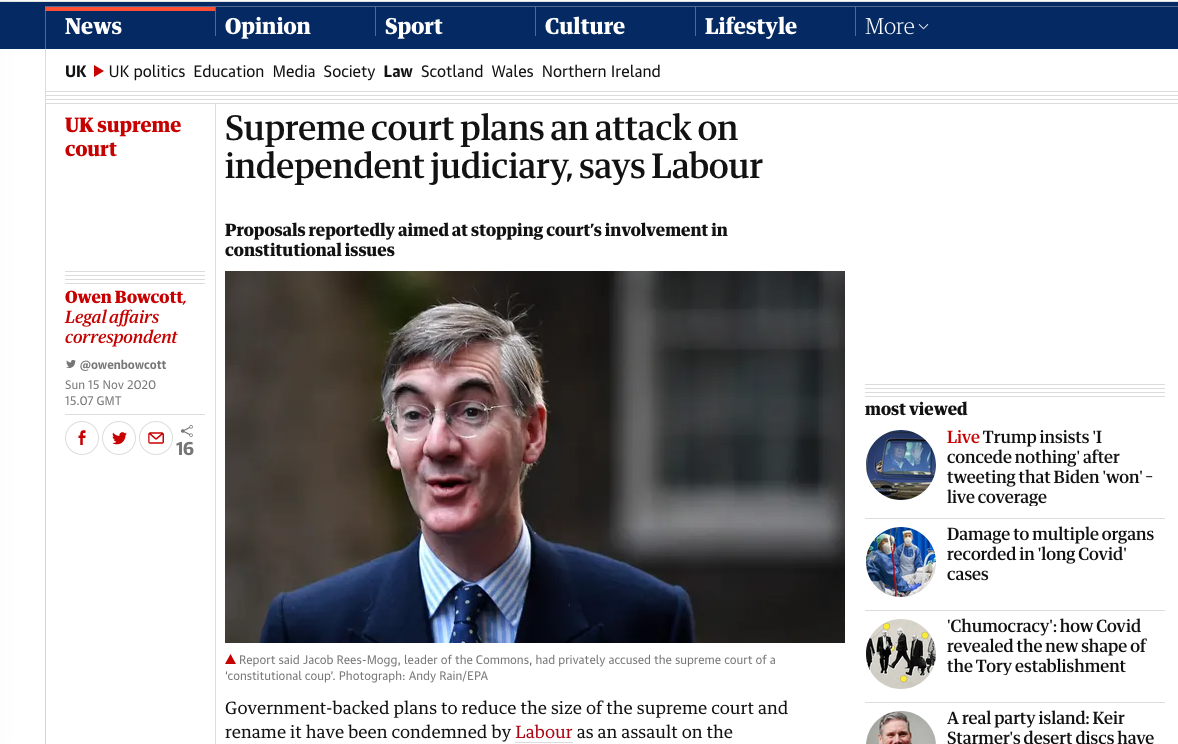UK Supreme Court plans an attack
« previous post | next post »
A headline in today's Guardian tells us that "Supreme court plans an attack on independent judiciary, says Labour" — but you'll probably guess without even following the link that plans is a plural noun rather than a 3rd-person singular tensed verb, and that the phrase "Supreme court plans" probably refers to someone's plans for the court, rather than the court's plans for something.
But here's the first line of the story, anyhow:
Government-backed plans to reduce the size of the supreme court and rename it have been condemned by Labour as an assault on the independence of the judiciary.
And the (online) front page version of the headline:

[h/t Bob Ladd]

Gregory Kusnick said,
November 15, 2020 @ 7:15 pm
I'd buy "US Supreme Court plans an attack", but surely "UK Supreme Court plan an attack".
John F said,
November 15, 2020 @ 7:25 pm
Couldn’t they have put a colon in? “Supreme court plans: attack on independent judiciary”.
On a related note: it vexes me greatly that the BBC style is that group nouns take plural verbs instead of singular. eg “The England team score a goal” instead of “The England team scores a goal”.
Paul Mulshine said,
November 15, 2020 @ 10:45 pm
As a journalist and headline writer of more than 40 years, I would say that headline violates the cardinal rule of headline-writing: The verb carries the headline. It should be a capital (or lowercase) crime to make the reader look at "plans" as a verb only to find it is a mere noun.
Twill said,
November 15, 2020 @ 11:26 pm
At what point is it less ambiguous to simply omit everything but the content words? At least here "Supreme court plans attack independent judiciary: Labour" is more intelligible (IMHO).
John Swindle said,
November 16, 2020 @ 3:13 am
The US Supreme Court can also be the subject of ambiguous headlines.
Supreme Court changes fuel rules to protect abortion access
https://apnews.com/article/michael-brown-lubbock-amy-coney-barrett-abortion-kentucky-93c22c1a77f10209f2ab27e6282183ad
Bob Ladd said,
November 16, 2020 @ 5:10 am
@John F: plural verb agreement with collective noun subject is not specifically "BBC style", but just UK English.
Joyce Melton said,
November 16, 2020 @ 8:24 am
Wow. Is Jacob Rees-Mogg the MP from the Uncanny Valley? He sure looks it in that picture.
Christian Johnson said,
November 17, 2020 @ 12:45 am
Would it *kill* these damn headline writers to add a hyphen in a compound modifier–where it belongs? Syntax works if it's "Supreme-court plans an attack on independent judiciary, says Labour." Better still, quotes around "an attack on independent judiciary":
Supreme-court plans 'an attack on independent judiciary,' says Labour
All good then.
Thomas Rees (no relation) said,
November 17, 2020 @ 9:49 am
@Joyce Melton: Wow. Finally an interpretation of the phenomenon that is JRM that makes sense!
Philip Anderson said,
November 17, 2020 @ 11:37 am
Jacob Rees-Mogg is known as the MP for the Nineteenth Century.
British usage allows a singular or plural verb after a collective noun. It can depend on whether the speaker is treating it as a single body or a group of individuals. And although an individual player may score, I’d think of it as a group effort.
Philip Taylor said,
November 17, 2020 @ 12:05 pm
I think that the classic example (for singular/plural agreement) is the committee. If a committee agree on something, then this is clearly an act by multiple parties (one person cannot agree with him/herself), so in such a context I would use a plural verb. If the committee were to rule, or state, or even decide, then it is acting as a single body and I would use a singular verb.
Jerry Friedman said,
November 17, 2020 @ 12:35 pm
On this subject, the Guardian headline had "says Labour", not "say Labour".
Quinn C said,
November 17, 2020 @ 2:14 pm
There are certainly times when I don't agree with myself, but to say I can't agree with myself would take it a bit too far.
Maurice Waite said,
November 19, 2020 @ 9:04 pm
Without progressing beyond the headline, it took me three readings to mentally parse 'plans' as a noun. It's the lack of a verb that throws you, as Paul Mulshine says. There would have been room for 'are', and then the awkwardness of having an article for 'attack' but no article for 'independent judiciary' could have been avoided: either 'Supreme court plans are attack on independent judiciary…' or, less telegraphically, 'Supreme court plans are an attack on the independent judiciary…'.